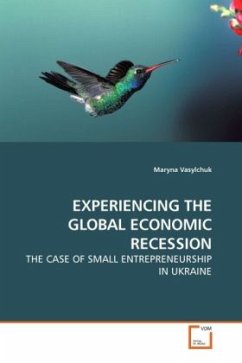During the financial downturn of 2008 many of big and stable corporations were bailed out or failed. Small business, by contrast, seems to be much more vulnerable to the crises. In the post-socialist Ukrainian context, where small business has only started to re-emerge eighteen years ago, global recession could wipe out weaker companies more easily. This thesis answers the question of surviving of small business in Ukraine addressing the notions of informality, embeddedness, and trust. General argument of the thesis is based on the analysis of eight cases. At the same time, my work leads through detailed discussion of three of them, which present negative, neutral and beneficial influence of the downturn. Focusing on how the ideas about entrepreneurship transformed to real enterprises, I highlight the structure of small businesses, and, further, analyze the reasons of experienced influence.







